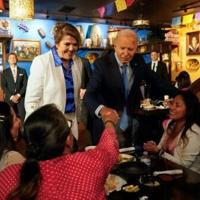Sonia Villamizar never voted in the United States despite becoming a citizen twenty years ago.
As the upcoming presidential election approaches and both parties focus on immigration issues, she is contemplating casting her vote for the first time.
However, neither side has convinced her yet.
“I don’t see a concrete plan to help migrants,” said Villamizar, who attended a Latino civil rights conference in Las Vegas this week in the battleground state of Nevada.
The 36-year-old represents undecided Latino voters, a demographic that Democrats need to win over to maintain power this November.
According to the Pew Research Center, there are 36.2 million eligible Latino voters in this election, comprising 14.7% of all potential voters.
Out of these, 13 million Latino US citizens are not registered to vote, including many young adults, according to Clarissa Martinez de Castro from the UnidosUS Latino Vote Initiative.
There are also Latinos like Villamizar who are registered but have not voted yet.
– Mobilizing voters –
Democrats are heavily investing in bilingual campaign ads and events in states with significant Latino populations such as Arizona, Nevada, New Mexico, and Texas.
Although President Joe Biden was supposed to attend a Latino community event in Las Vegas this week, he had to cancel after testing positive for Covid-19.
Regardless of the Democratic candidate in November, the party’s traditional Latino base in the southwestern United States will be crucial.
Francisco Aguilar, Nevada’s secretary of state, emphasized the importance of Latino votes in determining the next president of the United States.
At a panel event about mobilizing voters in Las Vegas, it was noted that only half of registered Latinos actually vote.
Adrian Fontes, Arizona’s secretary of state, highlighted the impact of increasing Latino voter turnout.
However, he mentioned that the party may struggle to engage new voters if they only focus on them two or three weeks before Election Day.
– ‘Empathy’ –
While Latinos traditionally lean towards Democrats over Republicans, the margin has narrowed in recent years.
A survey by Pew after Biden’s poor debate performance against Trump revealed a tie in Latino voting intentions, with 36% for each party.
Immigration has become a divisive issue for Democrats among Latinos.
The Biden administration has attempted to address this by implementing measures like tightening border security for asylum seekers and simplifying the residency process for undocumented spouses of US citizens.
Raquel Albuez, a Dominican resident in the US, emphasized the importance of having a government that shows consideration and empathy towards migrants.
She expressed the desire for a government that recognizes the contributions of migrants and provides support.
– ‘Conservative’ –
On the other hand, Trump has appealed to many discontented Latinos by promising mass deportations of illegal immigrants and vowing to close the border if reelected.
These policies resonate with established Latinos in the US who feel disconnected from recently arrived immigrants.
Some Latinos lean conservative, prompting efforts to educate them on the potential consequences of a Trump administration.
Trump’s economic policies have also gained support from some Latinos like Jose Suarez, who is reconsidering his vote after facing financial difficulties.
Nevada union leader Susie Martinez remains confident that the Latino community will continue to support Democrats in November, citing the stark contrast in agendas between Trump and Biden.
She believes that Latinos understand what’s important and will vote accordingly.
pr/amz/jgc/bjt





